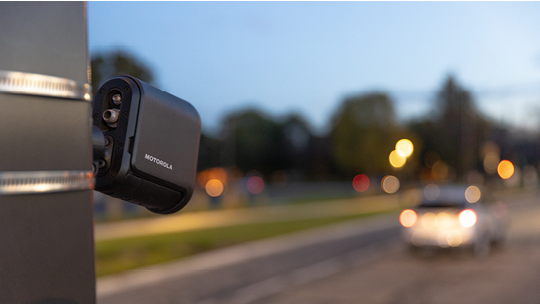On May 22, 2023, the Plano City Council approved the purchase of 40 L5Q and 10 L6Q Motorola deployable license plate reader (LPR) cameras. According to The Dallas Morning News, the new systems will be installed on poles located alongside roadways and parking lots identified as hot spots for criminal activities.
According to the city council agenda memo, a few months prior to the city’s approval, Motorola provided Plano Police with a portable L5Q LPR camera they installed near a self-storage facility where trailers had been stolen. Within hours, detectives were notified of a theft happening on the site and were able to identify the suspects thanks to the images captured by the LPR camera.
“The L6Q cameras will likely be installed near traffic intersections and along roadways of concern for real-time alerting,” continued the memo. “The L5Q devices will be utilized for standalone deployment at various other hotspots to address community crime trends and/or mounted on portable camera towers as needed to augment their existing capabilities.”
The memo also stated that Plano police have been using LPR mobile systems mounted on police vehicles successfully since 2009. “They have since led directly to the recovery of stolen vehicles and the apprehension of many wanted suspects,” police Lt. Glenn Cavin told The Dallas Morning News.
However, Plano police found that these mobile systems have limitations: data captures are limited to those places where large first responder vehicles are driven and if the identified vehicles move in a different direction, apprehension becomes difficult. The pole-mounted systems would help fix these issues, although studies have shown that LPR cameras are not always effective.
In August 2022, the Independent Institute, a public-policy research and educational nonprofit organization, released a detailed report on the use of LPR cameras in California. The report underscored the cameras show troubling error rates, citing the case of Denise Green, a citizen who was forced to the ground at gunpoint because her car was mistakenly identified as stolen. But LPR systems also raise concerns over the dangers of data sharing between public institutions as well as the systems providers like Motorola Solutions.
Additionally, as reported by The Dallas Morning News, the technology can be abused. A report by The Texas Tribune published in 2016 showed that the Kyle city council rescinded an agreement with Vigilant Solutions (now Motorola Solutions) that made the city pay 25% surcharge on the court fines for outstanding violations or warrants in exchange for free LPR and credit card machines to keep on police cars to collect unpaid fees on the roadside.
“When we first voted for it, I was very uncomfortable with it, because, really, after I had more and more time to think about it, the original plan really hurts the poor in the first place,” City Council Member Daphne Tenorio told The Texas Tribune at the time.
However, Cavin told The Dallas Morning News reports of improper use of the equipment will be investigated by the Professional Standards Unit. “There has been full transparency with the community, including the public posting of our directive online,” Cavin said.




